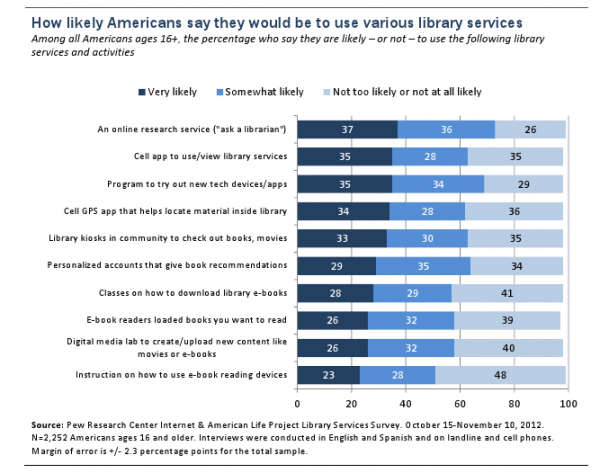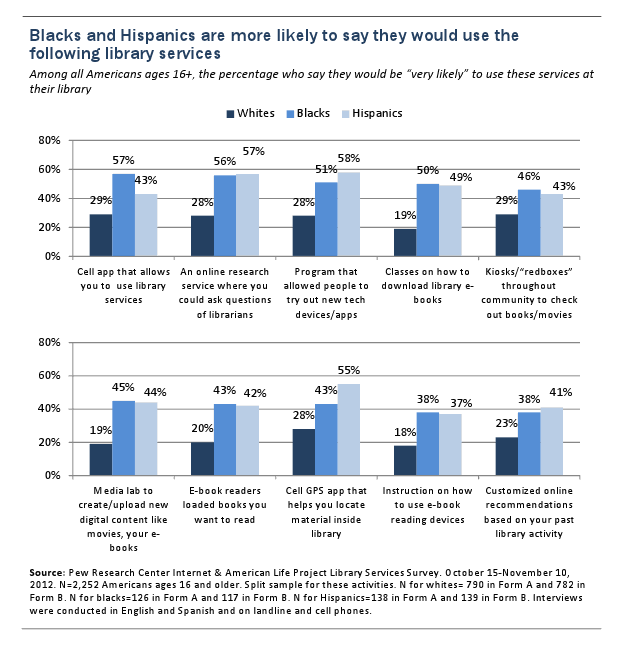Are Search Engines Driving Libraries To Extinction? Not Quite Yet
With today’s instant anywhere-anytime access to Google, Bing and Wolfram Alpha, where searching for information takes a few scant heartbeats via an internet-connected device, some people regard physical libraries as a quaint relics of a forgotten age. But new research from Pew Research Center’s Internet & American Life Project suggests just the opposite: that in […]

According to the study results, the traditional role played by libraries, including access to print works and professional librarians, is still important to most. Among the key findings:
- 80% of Americans ages 16 and older say borrowing books is a “very important” service libraries provide.
- 80% say reference librarians are a “very important” service of libraries.
- 77% say free access to computers and the internet is a “very important” service of libraries.
Despite a strong majority saying libraries are important, the study also found that usage is dropping: 22% of recent library users ages 16+ say their use of libraries has gone down in the past 5 years. In part that’s because search engines make life easier: 40% can get books, do research online and say the internet is more convenient than making an excursion to the local library.
One librarian who participated in the study said that most people, including students, didn’t know about the research resources offered by the library other than books. “Most students have no idea what a database is and therefore get their information from Google, while the tremendous resources available online from our library go unknown and unused.”
The study unearthed another need that libraries could relatively easily fulfill: providing “human powered search engines” providing answers or Quora-style threaded discussions initiated by patrons. 37% of Americans ages 16 and older would “very likely” use an “ask a librarian” type of service, and another 36% say they would be “somewhat likely” to do so.
Interestingly, libraries were early pioneers in offering these types of online “aska” (as in “ask a librarian”) services even before the advent of the earliest search engines. Many public libraries currently offer aska services, but clearly there’s a lack of awareness of their existence and availability.
What other kinds of things would people like to see offered by libraries? Not surprisingly, access to more high-tech products and services, such as:
- Access to technology “petting zoos” to try out new devices.
- “Amazon”-style customized book/audio/video recommendation schemes that are based on patrons’ prior library behavior
- Apps-based access to library materials and programs.
- “Redbox”-style lending machines or kiosks located throughout the community where people can check out books, movies or music without having to go to the library itself.
- GPS-navigation apps to help patrons local material inside library buildings.
Ironically, many public libraries currently offer these and other services, but the study found that just 22% say that they know all or most of the services their libraries offer now. This suggests that libraries need to do a better job of both educating and marketing, to get the word out and encourage patrons (perhaps even start thinking of patrons as “customers?”). Our colleague here at Search Engine Land, Gary Price, has been sounding this clarion call in his numerous presentations over the past decade, and it looks like his message is finally starting to have some impact.
Other major themes that emerged in the study included the importance of libraries working more closely with local communities, offering meeting space, extra-curricular study opportunities for children (especially those living in disadvantaged communities), opening up public spaces by moving less popular or older books into non-public storage, and in another nod toward the digitization trend, offering a wider selection of eBooks that patrons can “borrow” on their tablet devices.
Library Use & Demographics
The Pew study also looked at the breakdown of demographic differences in preferences for library services. Overall, blacks and Hispanics are significantly more likely than whites to be interested in all of the services mentioned, while older adults, especially those ages 65 and older, are the least likely age group to express an interest in any of these services. Unsurprisingly, people with lower levels of education and income were also more interested in the diverse services libraries have to offer.
Even if you’re in the camp of “you can find anything on the internet” the Pew study makes for interesting reading, exploring how the evolution of libraries is not only breaking down some of the “digital divide” issues, but also offering a compelling vision of how libraries and librarians can draw from their strengths and create new and useful services for the community – something they’ve always done, and that they’re continuing to do. To paraphrase the once-popular song title, it’s very obvious that “Google didn’t kill the library star.” Download the full report: Library services in the digital age (pdf).
How To Get The Most From Your Library
The best way to fully understand and take advantage of what your library has to offer, of course, is to make a full-scale recognizance mission, spending time familiarizing yourself with the physical layout of the building, getting to know the librarians, and poking and prodding the gadgets and online resources to see what they can do for you.
But there are also some great online resources. Here are some great “how-tos” for maximizing your library experience:
- From Lifehacker, Get the most of your local library — online, a great overview of what’s available at most libraries, and how to tap into those resources.
- Want to go really deep? Making the most of your library is an excellent overview of what’s available at most libraries, and how to use numerous resources beyond just “find and check out.”
- Prefer to watch rather than read? Check out the YouTube series Info Literacy from Bob Baker, Librarian Director at PCC libraries.
Contributing authors are invited to create content for Search Engine Land and are chosen for their expertise and contribution to the search community. Our contributors work under the oversight of the editorial staff and contributions are checked for quality and relevance to our readers. The opinions they express are their own.
Related stories
New on Search Engine Land

